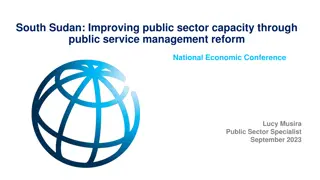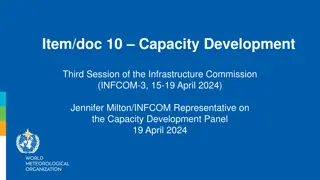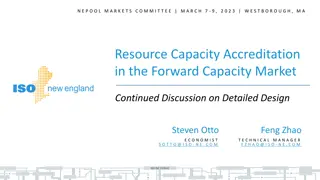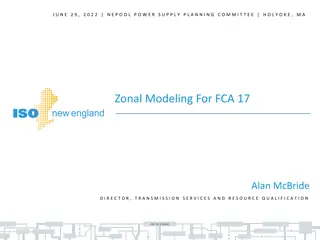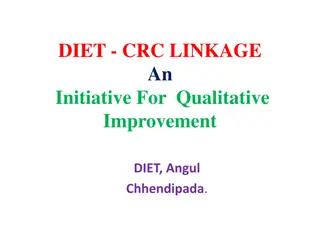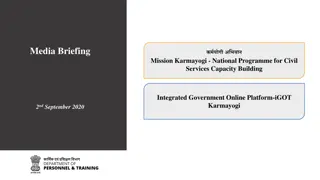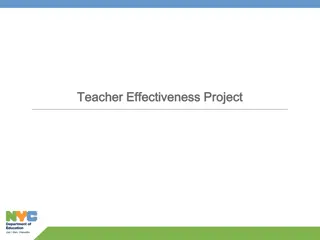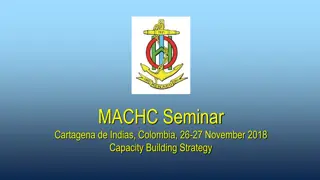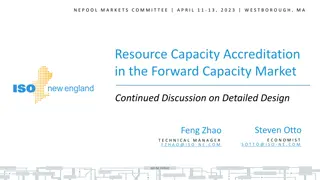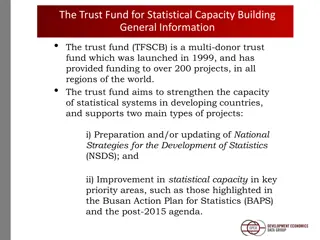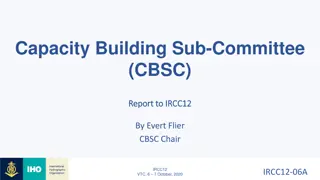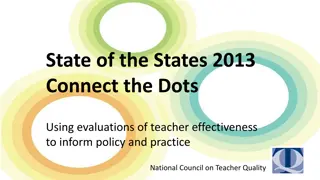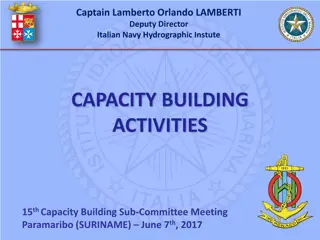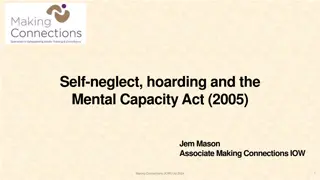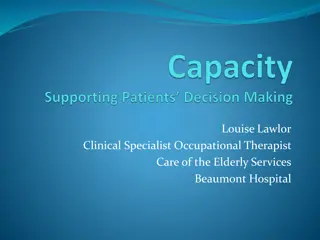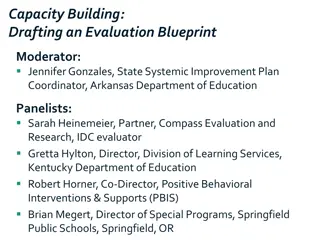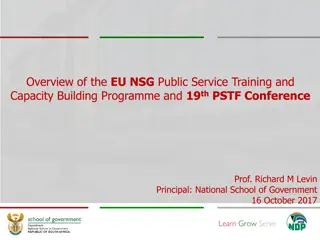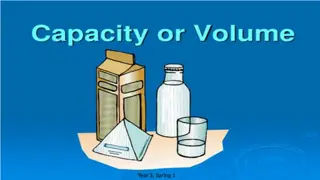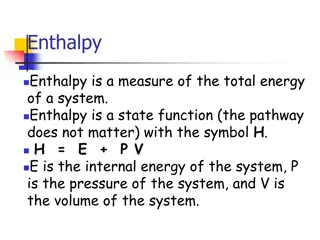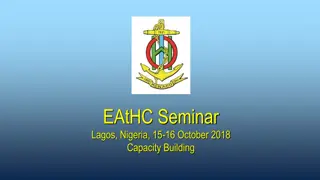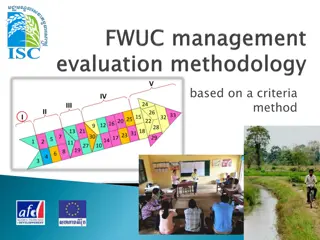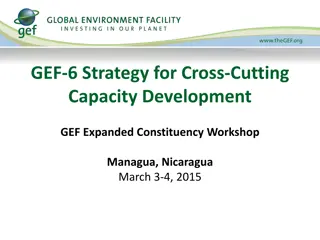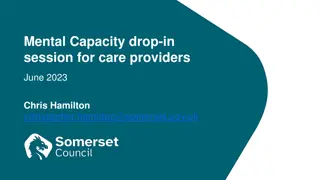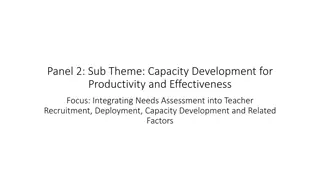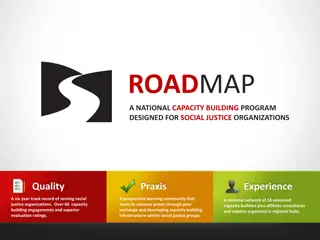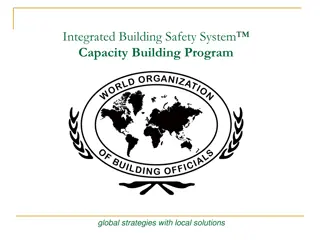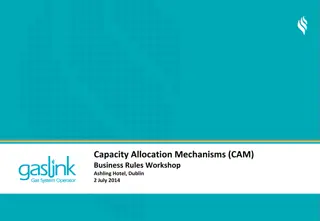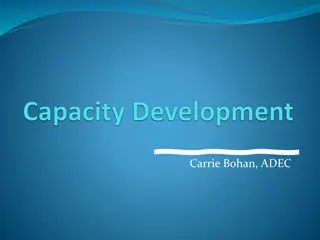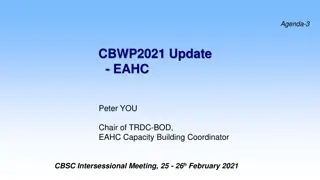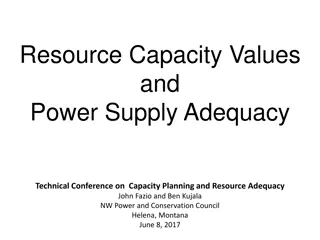Enhancing Public Service Professionalization Through National School of Government Positioning
This presentation outlines the strategic response to public service reform towards professionalization by positioning the National School of Government (NSG) to build state capacity, address deficiencies in various departments, and strengthen governance for effective service delivery in South Africa
0 views • 19 slides
SACE Teachers Conference: Enhancing Professional Development in Education
The SACE Teachers Conference focuses on improving teacher education through developing a National Framework for Teacher Education in SA. The Ministerial Committee on Teacher Education aims to create a coordinated system for both initial and continuing professional education. Recommendations include
1 views • 34 slides
Enhancing Public Sector Capacity Through Service Management Reform
South Sudan is working on improving public sector capacity through service management reform, focusing on institutionalizing capacity building, pay and grading, pension support, and strengthening the center of government. Lessons from capacity injection mechanisms and policy frameworks are guiding t
0 views • 16 slides
INFCOM Capacity Development Initiatives Overview
INFCOM's capacity development initiatives focus on enhancing Earth system observations, closing capacity gaps on weather services, and supporting new opportunities in competencies and capabilities. Collaboration and coordination mechanisms have been established to facilitate sharing of information a
0 views • 11 slides
Resource Capacity Accreditation in Forward Capacity Market Overview
Resource Capacity Accreditation project aims to enhance ISO-NE's accreditation processes in the Forward Capacity Market, supporting a reliable, clean-energy transition. Key concepts covered in this educational presentation include accreditation space, methods, benefits, challenges, and improvement o
1 views • 53 slides
Resource Capacity Accreditation in the Forward Capacity Market Discussion
The presentation discusses improvements in the Resource Capacity Accreditation project of ISO-NE's Forward Capacity Market to support a reliable, clean-energy transition. It includes details on seasonal components, reconfiguration auctions, trading obligations, and stakeholder schedules. Examples pr
3 views • 71 slides
Capacity Zone Modeling for Forward Capacity Auction 17 Results
This presentation unveils the Capacity Zone modeling calculations for Forward Capacity Auction 17 associated with the 2026-2027 Capacity Commitment Period by ISO-NE PUBLIC. It delves into boundary definitions, import-constrained zone modeling, and market rules guiding the assessments and modeling pr
0 views • 16 slides
Enhancing Teacher Capacity Building Through DIET-CRC Linkage Initiative
The DIET-CRC Linkage Initiative aims to strengthen CRCs academically for teacher capacity building programs and continuous professional development. It focuses on developing cluster-specific plans, fostering knowledge-sharing, and enhancing academic support at grassroots levels. The vision includes
0 views • 16 slides
Mission Karmayogi: Transforming Civil Services Capacity Building in India
Mission Karmayogi is a national program aimed at revolutionizing civil services capacity building in India. It addresses existing impediments, introduces a new national architecture for capacity building, and focuses on creating a future-ready civil service aligned with the vision of New India.
0 views • 15 slides
Proposal for Resource Capacity Accreditation in Forward Capacity Market
The ISO-NE has proposed improvements to the accreditation processes in the Forward Capacity Market (FCM) through the Resource Capacity Accreditation (RCA) project. The aim is to enhance the accreditation of resource contributions to ensure reliability during the transition to a cleaner energy mix. T
0 views • 59 slides
Understanding Teacher Education: A Comprehensive Overview
Teacher education encompasses the policies, procedures, and training designed to equip prospective teachers with the knowledge, skills, attitudes, and behaviors needed to excel in the classroom and the wider educational community. It involves imparting subject matter knowledge, pedagogic skills, chi
2 views • 56 slides
Enhancing Teacher Effectiveness Project Overview
The Teacher Effectiveness Project aims to create an integrated teacher evaluation and development system to support professional growth and student success in NYC/NY State. Through teacher assessment, development, and strategic decision-making, the project seeks to recognize and retain outstanding t
1 views • 11 slides
Hydrographic Capacity Building Strategies for Sustainable Development
Capacity building in hydrography involves assessing and supporting sustainable development of States to meet international maritime objectives. It is a process that goes beyond training and aims to enhance safety at sea, protect the environment, and boost national economic growth. The strategy is ex
8 views • 25 slides
Resource Capacity Accreditation in the Forward Capacity Market: Continued Discussion and Detailed Design
The Resource Capacity Accreditation (RCA) project by ISO-NE aims to enhance accreditation processes in the Forward Capacity Market (FCM) to support a reliable, clean-energy transition. This presentation focuses on seasonal components of Capacity Supply Obligations (CSO), Pay-for-Performance (PFP) ob
0 views • 58 slides
The Trust Fund for Statistical Capacity Building
The Trust Fund for Statistical Capacity Building (TFSCB) is a multi-donor trust fund launched in 1999, supporting over 200 projects worldwide to strengthen statistical systems in developing countries. It focuses on national strategy development and improving statistical capacity in key priority area
1 views • 5 slides
Contributions to Capacity Building Initiatives in 2020
The Capacity Building Sub-Committee (CBSC) report highlights the effects of the COVID-19 pandemic on capacity building efforts in 2020. Contributions from various sources like the IHO budget, donations, and support from countries like the Republic of Korea, Japan, and Canada are crucial for empoweri
0 views • 15 slides
Connecting Teacher Effectiveness Evaluations to Policy and Practice in Education
Explore the State of the States 2013 report on using teacher effectiveness evaluations to inform education policy and practice. The report highlights the structure of teacher evaluation systems, state requirements for teacher observations, additional teacher evaluation policies, and important lesson
1 views • 10 slides
Italian Navy Hydrographic Institute's Capacity Building Activities
Captain Lamberto Orlando Lamberti, Deputy Director of the Italian Navy Hydrographic Institute, presented on various capacity building initiatives at the 15th Capacity Building Sub-Committee Meeting in Paramaribo. The presentation highlighted Italian contributions, academic education programs, job tr
0 views • 17 slides
Understanding Self-Neglect, Hoarding, and the Mental Capacity Act (2005)
Self-neglect and hoarding are complex issues often intertwined with mental capacity challenges. The Mental Capacity Act (2005) outlines capacity assessments, decision-making criteria, and challenges faced by professionals in safeguarding individuals. Recognizing the need for trauma-informed care in
1 views • 16 slides
Understanding Legal and Mental Capacity in Healthcare Decisions
Clinical specialist occupational therapist, Louise Lawlor, advocates for patients' rights and decision-making capacity in healthcare settings. She emphasizes the importance of legal and mental capacity in making informed decisions, highlighting relevant legislation, guidance documents, and a functio
0 views • 24 slides
Enhancing State Capacity for Data Utilization in Education Evaluation
Explore the process of drafting an evaluation blueprint to build state capacity for accurate data collection, reporting, and utilization in education. The discussion covers IDC evaluation approaches, qualitative methodologies, state perspectives on capacity building, and initial feedback. Kentucky's
0 views • 23 slides
Partnership Between NSG and EU for Capacity Building - SA-EU Relations Overview
The partnership between the National School of Government (NSG) and the European Union (EU) through the Public Service Training and Capacity Building Programme aims to strengthen institutional capacity for human development in South African public administration. This collaboration supports the stra
0 views • 21 slides
Exploring Capacity and Volume in Practical Settings
Explore the concepts of volume and capacity through engaging activities involving measuring liquid in containers, understanding units like milliliters and liters, and solving capacity-related questions. Discover how to work out different measurements and practice practical capacity in the kitchen wi
0 views • 7 slides
Understanding Enthalpy and Heat Capacity in Chemistry
Enthalpy is a measure of total energy in a system, represented as H = E + P.V. Heat at constant pressure relates to enthalpy changes. Calorimetry and heat capacity help measure and understand heat in chemical reactions. Specific heat capacity and molar heat capacity play key roles in determining ene
0 views • 16 slides
Workshop on New Approaches to Statistical Capacity Development in Lao PDR
This workshop, hosted by PARIS21 and UNDP, focuses on enhancing statistical capacity development in Lao PDR. It covers topics like successful capacity development programs, partnerships for national statistics development, and prioritizing needs versus international requirements. The Lao Statistics
0 views • 15 slides
Capacity Building for Sustainable Development in Hydrography and Nautical Charting
Capacity building in hydrography and nautical charting involves assessing and assisting in sustainable development to meet international objectives and obligations. It is not just training but a strategic process involving Member States, organizations, and individuals, with a focus on awareness, act
0 views • 25 slides
Rich Township High School District 227 Human Resources Overview
Rich Township High School District 227's Human Resources department is dedicated to supporting the district's goals through its valuable staff members. The department focuses on employee demographics, teacher education, pupil/teacher ratios, teacher retention, salaries, faculty trends, teacher atten
0 views • 16 slides
Changes in Capacity Allocation Regulations for Gas Infrastructures in Portugal
The new regulation in Portugal brings significant changes in capacity booking and trading to promote convergence with CAM NC and enable a secondary market. Major changes include ex-ante payment of capacity rights, capacity allocation via a booking platform, and enhancement of liquidity in the second
0 views • 13 slides
The Assisted Decision-Making (Capacity) Act 2015 in the Criminal Justice Context
The Assisted Decision-Making (Capacity) Act 2015 introduces key reforms such as the abolition of wards of court system for adults, a statutory functional test of capacity, new guiding principles, a three-tier framework for support, and tools for advance planning. It emphasizes functional assessment
0 views • 17 slides
Understanding Capacity Challenges in Wills: Legal Insights
Testators must possess mental capacity when making a will, as established in legal cases like Banks v. Goodfellow. The common law test for testamentary capacity remains relevant despite the Mental Capacity Act 2005. The Banks v. Goodfellow test outlines the required mental power for making a valid w
0 views • 18 slides
Capacity Building and Evaluation Process for Water User Committees
Practical steps are outlined for enhancing the capacity of Water User Committees (WUCs) in their operational tasks through participatory evaluation processes. This involves identifying problems, educating the committee, ensuring adherence to roles, setting improvement priorities, and comparing viewp
0 views • 14 slides
Capacity Development Strategies and Examples in Environmental Management
Capacity development (CD) is the enhancement of individuals, organizations, and societies to tackle environmental issues and integrate environmental sustainability into policies. The Global Environment Facility (GEF) focuses on National Capacity Self-Assessments (NCSAs) and critical projects to buil
0 views • 10 slides
Somerset Mental Capacity Training Session June 2023
This information outlines a mental capacity drop-in session for care providers in June 2023, hosted by Chris Hamilton from Somerset Council. It covers topics like the aim of the Mental Capacity Act, the Somerset mental capacity competency framework, and the importance of staff training. It emphasize
0 views • 21 slides
Enhancing Teacher Effectiveness Through Needs Assessment and Capacity Development
Integrating needs assessment into teacher recruitment, deployment, and capacity development is crucial for ensuring equity, inclusiveness, and efficiency in education delivery. By addressing teacher and related factors, such as gender balance, subject matter specialization, and allocation of resourc
0 views • 8 slides
National Capacity Building Program for Social Justice Organizations
A six-year track record of serving social justice organizations with over 60 capacity-building engagements and a focus on advancing praxis through a progressive learning community. 16 seasoned capacity builders work in regional hubs to provide customized services, promote social movement development
0 views • 11 slides
Empowering Communities: Integrated Building Safety System Capacity Building Program
The World Organization of Building Officials (WOBO) advocates for building safety through global strategies and local solutions. Their program focuses on promoting stronger and safer communities worldwide, offering technical expertise, educating the public, and collaborating with corporate partners.
0 views • 29 slides
Capacity Allocation Mechanisms (CAM) Business Rules Workshop Summary
This summary provides insights into the Capacity Allocation Mechanisms (CAM) Business Rules Workshop held at Ashling Hotel, Dublin on July 2, 2014. The workshop covered topics such as CAM business rules scope, key features, auction processes, code modifications, implementation timelines, and consult
0 views • 32 slides
Understanding Capacity Development in Water Systems
Capacity development is crucial for water systems to acquire and maintain technical, managerial, and financial capabilities in order to consistently provide safe drinking water. Federal requirements mandate new public water systems to demonstrate capacity, with states required to have strategies to
0 views • 8 slides
EAHC Intersessional Meeting Updates and Follow-up Activities February 2021
The EAHC Intersessional Meeting held on 25-26 February 2021 discussed updates on the Capacity Building Program for 2021, including accepted projects and those earmarked for TRDC. It also addressed follow-up activities due to the challenges faced in running capacity building programs this year. Membe
0 views • 6 slides
Resource Capacity Values and Power Supply Adequacy Conference Highlights
Explore insights from the Resource Capacity Values and Power Supply Adequacy Technical Conference, covering topics like integrated vs. standalone capacity values, utilizing hydro storage to increase capacity, and the 2021-22 Adequacy Summary. Learn about the importance of integrated capacity values
0 views • 9 slides


